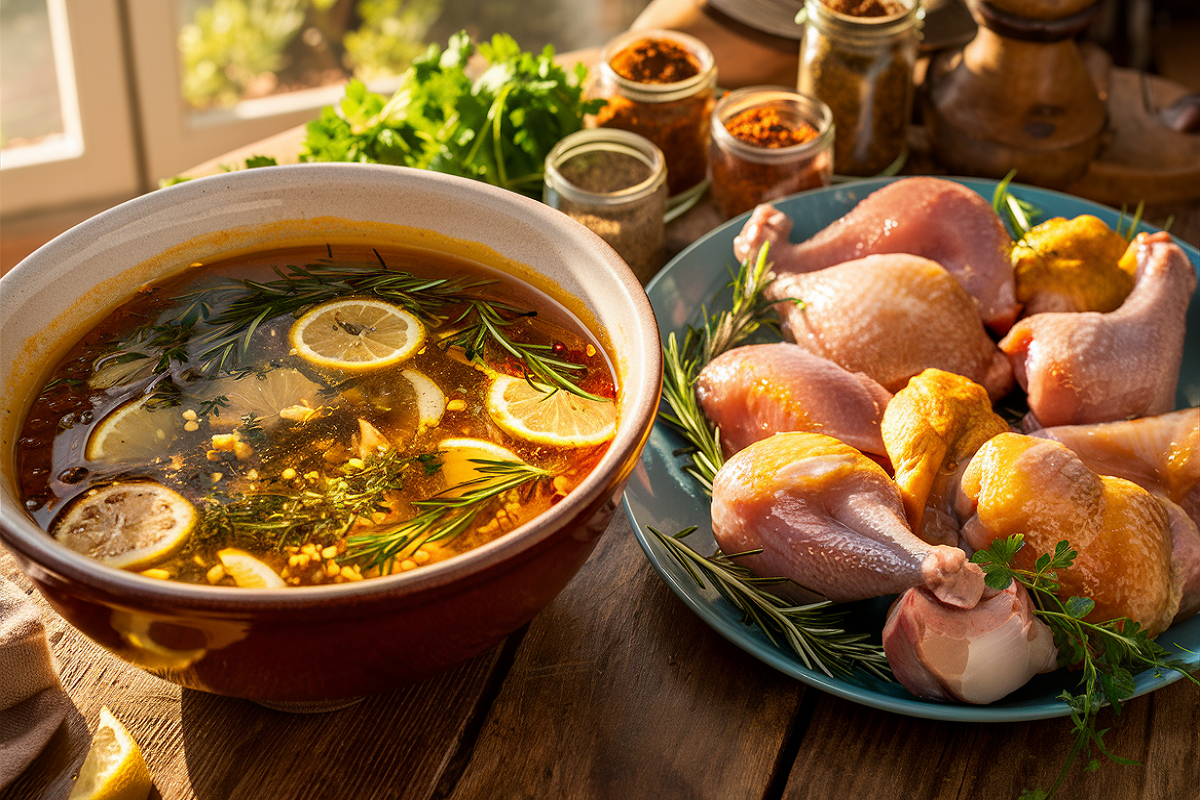
Introduction to Marinating Chicken: Enhancing Flavor and Texture
Marinating chicken is a key technique to enhance both the flavor and texture of your meals. Whether you’re grilling, baking, or frying, knowing the optimal marination duration can dramatically improve the quality of your dishes. This article explores various marinating methods, focusing specifically on how long chicken should be marinated to ensure it is perfectly seasoned and irresistibly tender. From choosing the right marinades to understanding their effects on different cuts of chicken, we’ll cover all you need to optimize your poultry’s marination period for the best results.
Introduction to Marinating Chicken
Marinating chicken is a tried and true method to infuse flavor deep into the meat and achieve a more tender, juicy outcome. But why exactly should you marinate chicken, and what makes this process so beneficial?
Why Marinate Chicken?
Marinating isn’t just about adding flavor; it’s also about texture. By soaking chicken in a marinade, you’re starting a process that can help tenderize the meat. Marinades often contain acidic ingredients like lemon juice or buttermilk which work to break down tough muscle fibers, making the chicken softer and more pleasant to eat. Additionally, the marinating time plays a crucial role in ensuring that the flavors penetrate deeply without overpowering the meat’s natural taste.
Moreover, marinating can make cooking more forgiving. A good marinade, especially with lean cuts like chicken breasts, can help keep the meat moist and flavorful, even if you slightly overcook it. It’s a fantastic way to add a safety net to your cooking, particularly if you’re still honing your grilling or baking skills.
Types of Marinades
People generally use three main types of marinades for chicken:
- Acidic Marinades: These include ingredients like citrus juices or vinegars which tenderize meat by breaking down its proteins. However, because chicken is sensitive to acid, it’s crucial not to let it marinate too long in acidic mixtures to avoid a mushy texture.
- Enzymatic Marinades: Ingredients like pineapple, papaya, and mango contain natural enzymes that help break down protein fibers. These can be particularly effective for tough cuts but should be used cautiously as they can overly soften the meat if left too long.
- Dairy-Based Marinades: Yogurt and buttermilk are milder and offer a gentler tenderizing effect. They are perfect for long, slow marination, especially if you’re preparing tandoori chicken or similar dishes.
Each type of marinade brings its own set of flavors and benefits, and choosing the right one can depend heavily on the cooking method and the final flavor profile you’re aiming for. Remember, the right marination duration can vary based on the ingredients and the chicken cut, so it’s essential to tailor the process to your specific needs.
Understanding Marination
Grasping the nuances of marination can significantly elevate your culinary game, allowing each dish to reach its full flavor potential. Here, we’ll delve into the ideal marinating times for various cuts of chicken and explore how different marinating durations affect the meat’s flavor and texture.
Recommended Marination Times
The duration for which chicken should be marinated depends largely on the type and cut of the meat. Here’s a brief guide to help you nail the timing:
- Chicken Breasts: These lean cuts are best marinated for 30 minutes to 2 hours. Prolonged exposure to acidic marinades can lead to a tough, rubbery texture, so it’s best to keep watch.
- Dark Meat (Thighs and Drumsticks): More forgiving than white meat, dark cuts can benefit from 1 to 4 hours of marinating. The extra fat content in these pieces helps them remain juicy and flavorful.
- Whole Chicken: When you’re planning to marinate a whole chicken, anywhere from 4 to 12 hours is suitable. The larger mass requires a longer time for flavors to permeate fully.
Understanding these times can help ensure that your chicken remains succulent and packed with flavor, without any of the drawbacks of over-marinating.
Marination Time by Chicken Type
Different preparations call for specific marination times to optimize both taste and texture:
- Boneless and Skinless Chicken: Quick and convenient, these cuts are ideal for short marination times, especially if you’re in a rush. Even a brief 30-minute marinade can infuse ample flavor and aid in tenderization.
- Bone-In Chicken: Requires a bit longer in the marinade to achieve the desired depth of flavor. Typically, 2 to 6 hours is sufficient depending on the recipe and your flavor goals.
- Whole Chicken: Given its size and density, marinating a whole chicken for up to 12 hours can dramatically enhance its flavor, making it a perfect candidate for long, slow marination before a hearty family meal.
Effects of Over-Marinating
While it might seem that longer marination would only deepen the flavors, there’s such a thing as too much. Over-marinating chicken, especially in highly acidic marinades, can lead to mushy textures and an overpowering taste that masks the natural flavor of the chicken. It’s crucial to balance the marination time with the type of marinade used to avoid these culinary pitfalls. Opt for shorter times with high-acid marinades and longer durations with milder, dairy-based options to keep your chicken at its best.
Optimal Marination Times
Choosing the right marination time is crucial for achieving the perfect balance of flavor and texture in your chicken dishes. This section will cover optimal marination times for different cooking methods and provide insights into how these times affect the final result of your cooking.
Marination Time for Grilled Chicken
Grilling is all about striking the right flavor note while achieving that perfect sear. For grilled chicken:
- Boneless, Skinless Breasts and Thighs: Marinate for 30 minutes to 2 hours. This is enough time to infuse the chicken with flavors without the meat becoming too soft or mushy.
- Bone-In Pieces: These can handle longer marination times, typically 1 to 4 hours. This allows the marinade to penetrate deeper into the meat, complementing the smoky flavors from grilling.
Using the right marinade for grilling is also crucial. Ingredients like garlic, herbs, and citrus pair well with the charred, smoky notes of grilled chicken, enhancing the overall sensory experience.
Marination Time for Baked Chicken
Baking allows for deeper flavor penetration, especially when the chicken is cooked slowly:
- Boneless, Skinless Cuts: These should be marinated for at least 1 hour and up to 4 hours. This time frame helps to ensure that the chicken doesn’t dry out during baking and remains juicy and tender.
- Bone-In Pieces: Since they take longer to cook, they can be marinated for 2 to 6 hours, which helps to infuse more robust flavors throughout the meat.
When baking, consider using marinades with a base of olive oil or yogurt, which helps to keep the chicken moist and tender while it cooks through.
Marination Time for Frying
Fried chicken benefits from a flavorful coating and a juicy interior, which can be achieved with proper marination:
- Boneless, Skinless Cuts: A quick marination of 30 minutes to 1 hour is sufficient, especially if the marinade includes buttermilk, which helps to tenderize the chicken and keep it moist.
- Bone-In Pieces: These are best marinated for 2 to 4 hours to ensure that every bite is flavorful and that the marinade complements the crispy exterior.
For frying, marinades that include buttermilk or a touch of acidity like lemon juice can be particularly effective, adding a subtle tang that cuts through the richness of the fried coating.
By understanding and applying these marination times, you can ensure that your chicken is not only flavorful but also cooked to perfection, regardless of the method you choose. Remember, the key to a successful marinade isn’t just the ingredients but also the timing, so keep these tips in mind to elevate your next chicken dish!
Marinating Techniques
Mastering the technique of marinating chicken can make a substantial difference in your cooking, ensuring that every piece is bursting with flavor and cooked to perfection. Here, we’ll go over some essential tips and safety guidelines to help you marinate chicken effectively.
How to Marinate Chicken
To get the most out of your marinade, follow these steps:
- Choose Your Marinade: Pick a marinade that complements the cooking method and the final flavor you want. Whether it’s acidic, enzymatic, or dairy-based, make sure it suits the type of chicken you’re preparing.
- Prepare the Chicken: If using frozen chicken, ensure it’s completely thawed before marinating to allow even absorption of flavors. Trim any excess fat to help the marinade coat the meat more uniformly.
- Marinating Container: Always use a non-reactive container such as glass, ceramic, or plastic for marinating. Metal containers, especially those made of aluminum or copper, can react with acidic marinades and alter the flavor of your chicken.
- Cover and Refrigerate: Chicken should be marinated in the refrigerator, not at room temperature, to prevent bacterial growth. Cover the chicken fully with the marinade, then cover the container with a lid or plastic wrap.
Ensuring the chicken is fully immersed and stored safely enhances the flavor without compromising food safety.
Marination Safety Tips
Safety is paramount when marinating chicken:
- Refrigeration: Always marinate chicken in the refrigerator at or below 40°F. Marinating at room temperature can allow bacteria to grow rapidly.
- Cross-Contamination: Avoid using the same utensils and containers for raw and cooked chicken without proper cleaning. Similarly, never baste cooked chicken with the same marinade used on raw chicken.
- Marinade Reuse: If you plan to use some of the marinade as a sauce, set aside a portion before it touches the raw chicken. You must boil marinade that has been in contact with raw chicken for at least 5 minutes before safely using it as a cooking sauce.
Following these tips will not only improve the quality and safety of your marinated chicken but also enhance your overall cooking experience. Proper marination, when done safely, transforms simple chicken dishes into delightful culinary creations that are both safe and delicious to eat.
Cooking Marinated Chicken
Once your chicken is well-marinated, cooking it correctly is just as crucial to ensure the flavors truly come to life. Here, we’ll explore different methods to cook marinated chicken, ensuring that it’s deliciously moist and infused with flavor.
Grilling Marinated Chicken
Grilling is ideal for achieving a smoky flavor and a beautifully charred exterior:
- Preheat the Grill: Ensure your grill is hot before adding the chicken. This helps to sear the outside quickly, locking in flavors.
- Reduce Flare-Ups: Since marinades often contain oil, dripping fat can cause flare-ups. Keep a part of the grill less hot where you can move the chicken if it starts to burn.
- Cooking Time: Depending on the thickness, cook chicken breasts for 6-8 minutes on each side and legs or thighs for 10-12 minutes per side. Always ensure the chicken reaches an internal temperature of 165°F.
Baking Marinated Chicken
Baking is a fuss-free method that allows for deeper flavor penetration:
- Preheat Your Oven: Set your oven to 375°F for optimal cooking.
- Arrange Chicken: Place the marinated chicken in a single layer on a baking tray or in a baking dish. Pour some of the marinade over the top for extra moisture.
- Baking Time: Bake chicken breasts for 25-30 minutes and thighs or drumsticks for 35-40 minutes, until the chicken is cooked through and the juices run clear.
Frying Marinated Chicken
For a crispy exterior and juicy interior, frying is the way to go:
- Heat Oil: Use enough oil to cover the bottom of your pan, and heat it until it shimmers.
- Avoid Crowding: Cook the chicken in batches if necessary to ensure it fries evenly and the temperature of the oil doesn’t drop too much.
- Cooking Time: Depending on the size of the pieces, cook for about 7-10 minutes on each side until golden brown and cooked through.
Each cooking method offers its unique set of flavors and textures to marinated chicken. By carefully managing cooking times and temperatures, you can ensure that your chicken is not only safe to eat but also incredibly satisfying. Whether you’re grilling, baking, or frying, the key is to keep an eye on the chicken to prevent overcooking, which can dry out the meat despite the marinade’s effects. Proper cooking techniques will allow the flavors you’ve infused into the chicken to shine, making each bite a delight truly.
Conclusion
Marinating chicken is more than just a culinary step; it’s a blend of science and personal preference that enhances both the flavor and texture of the meat. Understanding the different types of marinades—acidic, enzymatic, and dairy-based—and their appropriate uses allows for a tailored approach to each dish. Whether you’re aiming to tenderize a tough cut or infuse a delicate flavor, the choice of the marinade and the marination time are key to achieving the desired results.
Each cooking method, from grilling to baking to frying, benefits uniquely from marination. For example, grilling is complemented by marinades that can withstand high heat and impart a smoky flavor, while baking benefits from marinades that enhance moisture retention and deepen flavors during the slower cooking process. By adjusting the marination time according to the type and cut of chicken, you can prevent the common pitfalls of over-marinating, such as mushiness or overpowering flavors.
Finally, remember that the perfect marination blends technique with timing. It’s not only about selecting flavorful ingredients but also about marinating for an optimal duration to maintain the quality and texture of the meat. Following the safety tips provided ensures that every dish is not only delicious but also safe to eat. With these guidelines, you have all the tools you need to elevate your next chicken dish into a flavorful and juicy masterpiece.. Happy cooking!
FAQs on Marinating Chicken
How long should you let the chicken marinate?
The optimal marination time for chicken varies depending on the cut and the type of marinade used. Generally, you should marinate boneless chicken breasts for 30 minutes to 2 hours, while tougher cuts like thighs and drumsticks can benefit from 1 to 4 hours of marination. You can marinate whole chickens for longer periods, up to 12 hours. It’s important not to over-marinate, especially with acidic marinades, as they can start to break down the proteins in the chicken, leading to a mushy texture.
Is chicken better the longer you marinate it?
Not necessarily. While it might seem like more time in the marinade would mean more flavor, marinating chicken for too long can actually have negative effects. Acidic marinades can make the outer layer of the meat mushy if left for too long. The key is finding the right balance to enhance flavor without compromising texture.
How long can marinated chicken be in the fridge?
You can safely store marinated chicken in the refrigerator for up to two days. Beyond this point, the quality and safety of the meat can begin to decline. For the best results, cook the chicken within 48 hours of marinating.
How long can marinated meat stay in the fridge?
Like marinated chicken, you can generally keep other marinated meats such as beef, pork, or lamb in the fridge for up to two days. If the marinade contains highly acidic ingredients, it’s better to use or cook the meat sooner to avoid changes in texture and flavor.
It’s important to use the marinating time for each type of meat and marinating technique not only to enhance flavor but also to preserve the texture and quality of the meat.

